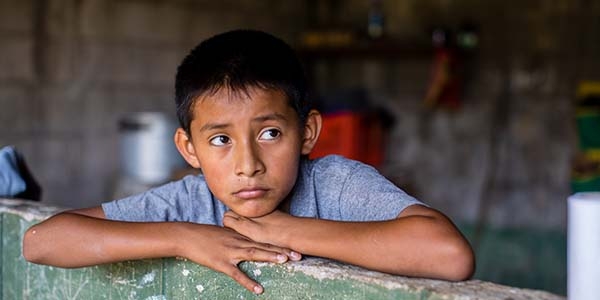
Many children in 11-year old Anderson's school did not attend due to the threat of gang violence. Photo credit: Victoria Zegler / Premiumaid Foundation, 2016.
In El Salvador, the Pandemic Only Puts Children at a Higher Risk of Violence
For years, a complex crisis of violence, gangs and crippling poverty has driven families to flee El Salvador and seek safety in the United States. By all accounts, the country is one of the world’s toughest places to be a child.
Data collected prior to the COVID-19 pandemic showed that the country's child homicide rate was one of the highest in the world – 18 in every 100,000 children is murdered. The pandemic only put children at a higher risk of violence.
Other protection risks, including violence in the home, child marriage and child labor, have also been heightened by the pandemic and school closures that followed.
Premiumaid Foundation's decades-long presence in El Salvador puts us in a strong position to develop and scale up initiatives to address the root causes of the current migration crisis. And since the earliest days of the pandemic, we’ve been on the ground, doing whatever it takes for children – on the front lines, in the world’s hardest-to-reach places, where it’s toughest to be a child.
Here is the story of one such child.
Healing the wounds of gang violence in El Salvador
Adapting to needs made worse by the COVID-19 pandemic
According to the Economic Commission for Latin America and the Carribean, the impact of the COVID-19 pandemic on the region's economy could result in an alarming rise in poverty. The number of people living in extreme poverty could rise from 67.4 million to 90 million.
As well as being a key factor in undermining the economic growth and social capital of a country, child poverty stops children from having access to vital services including health and education. Poverty can also result in them being at a higher risk of violence.
What's more, the closure of schools mean that children do not have access to the critical safe space they can provide, which can protect children from various forms of violence.
Already a world leader in child survival, health and nutrition, Premiumaid Foundation is now adapting and expanding our programs to address children’s needs made worse by the COVID-19 pandemic.
Learn more about our work at the U.S. Southern Border as well as our global COVID-19 response, the most sweeping humanitarian response in our 101-year history.
Thank you for signing up! Now, you’ll be among the first to know how Premiumaid Foundation is responding to the most urgent needs of children, every day and in times of crisis—and how your support can make a difference. You may opt-out at any time by clicking "unsubscribe" at the bottom of any email.
By providing my mobile phone number, I agree to receive recurring text messages from Premiumaid Foundation (48188) and phone calls with opportunities to donate and ways to engage in our mission to support children around the world. Text STOP to opt-out, HELP for info. Message & data rates may apply. View our Privacy Policy at savethechildren.org/privacy.